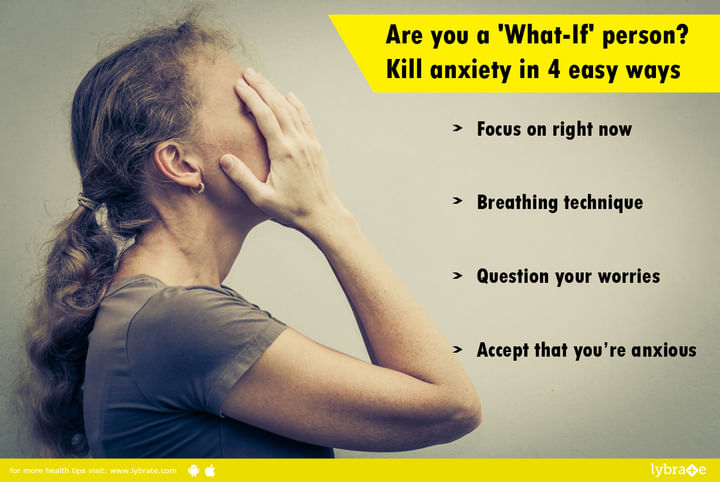Get the App
For Doctors
Login/Sign-up
Last Updated: Aug 29, 2019
BookMark
Report
Are you a 'What-If' person? Kill anxiety in 4 easy ways
Ms. Shivani Misri SadhooPsychologist • 25 Years Exp.Post graduate in counselling psychology, Gottman Method Therapist
Are you a 'What-If' person? Kill anxiety in 4 easy ways
Thinking about dangers and risks is a normal phenomenon, it helps us to stay alert and to become a good problem solver. It’s only when worrying gets out of a person’s control, it turns into a problem. If a person is constantly preoccupied with “what-if " and keeps imagining worst-case scenarios, worry actually turns into the cause for high pulse rate, insomnia, poor mental and physical health.
Here are 4 simple steps to cope with anxiety and worry.
1. Breathing technique: The first thing to do when you get anxious is to take deep breath. Deep breathing is a powerful anxiety-reducing technique because it activates the body’s relaxation response. Try slowly inhaling to a count of 5, filling your belly first and then your chest, gently holding your breath to a count of 5, and slowly exhaling to a count of 5 and repeat several times.
2. Accept that you’re anxious: Remember anxiety is just a feeling, like any other feeling, by reminding yourself that anxiety is simply an emotional reaction, you can start to accept it. Acceptance is critical because trying to eliminate anxiety often worsens it. But accepting your anxiety doesn’t mean liking it or resigning yourself to a miserable existence. It just means you would benefit by accepting reality as it is – and in that moment, reality means 'anxiety' you are feeling.
3. Question your worries. When people are anxious, most of the time their brains start coming up with all sorts of unrealistic ideas, which most likely will never occur. To avoid unnecessary worry, one should ask himself / herself a few questions like:
- Is there a reason to believe something is wrong?
- What evidence is there that something is wrong?
- If the worst possible outcome happens, what would be so bad about that?
- What are the options I can use to handle the situation at hand?
4. Focus on right now: When people are anxious, they are usually obsessing about something that might occur in the future. It is important that when a person becomes anxious, he/she takes a deep breath and pay attention to what’s happening right now, around them. Even if something serious is happening, focusing on the present moment will improve your ability to manage the situation.
If you would like to consult with me privately, please click on 'Consult'.
From Lybrate: If you found this tip useful, please thank the doctor by clicking on the heart icon below. Also, spread good health by sharing this tip with your loved ones over WhatsApp, Facebook and other media.
Thinking about dangers and risks is a normal phenomenon, it helps us to stay alert and to become a good problem solver. It’s only when worrying gets out of a person’s control, it turns into a problem. If a person is constantly preoccupied with “what-if " and keeps imagining worst-case scenarios, worry actually turns into the cause for high pulse rate, insomnia, poor mental and physical health.
Here are 4 simple steps to cope with anxiety and worry.
1. Breathing technique: The first thing to do when you get anxious is to take deep breath. Deep breathing is a powerful anxiety-reducing technique because it activates the body’s relaxation response. Try slowly inhaling to a count of 5, filling your belly first and then your chest, gently holding your breath to a count of 5, and slowly exhaling to a count of 5 and repeat several times.
2. Accept that you’re anxious: Remember anxiety is just a feeling, like any other feeling, by reminding yourself that anxiety is simply an emotional reaction, you can start to accept it. Acceptance is critical because trying to eliminate anxiety often worsens it. But accepting your anxiety doesn’t mean liking it or resigning yourself to a miserable existence. It just means you would benefit by accepting reality as it is – and in that moment, reality means 'anxiety' you are feeling.
3. Question your worries. When people are anxious, most of the time their brains start coming up with all sorts of unrealistic ideas, which most likely will never occur. To avoid unnecessary worry, one should ask himself / herself a few questions like:
- Is there a reason to believe something is wrong?
- What evidence is there that something is wrong?
- If the worst possible outcome happens, what would be so bad about that?
- What are the options I can use to handle the situation at hand?
4. Focus on right now: When people are anxious, they are usually obsessing about something that might occur in the future. It is important that when a person becomes anxious, he/she takes a deep breath and pay attention to what’s happening right now, around them. Even if something serious is happening, focusing on the present moment will improve your ability to manage the situation.
If you would like to consult with me privately, please click on 'Consult'.
From Lybrate: If you found this tip useful, please thank the doctor by clicking on the heart icon below. Also, spread good health by sharing this tip with your loved ones over WhatsApp, Facebook and other media.



+1.svg)
